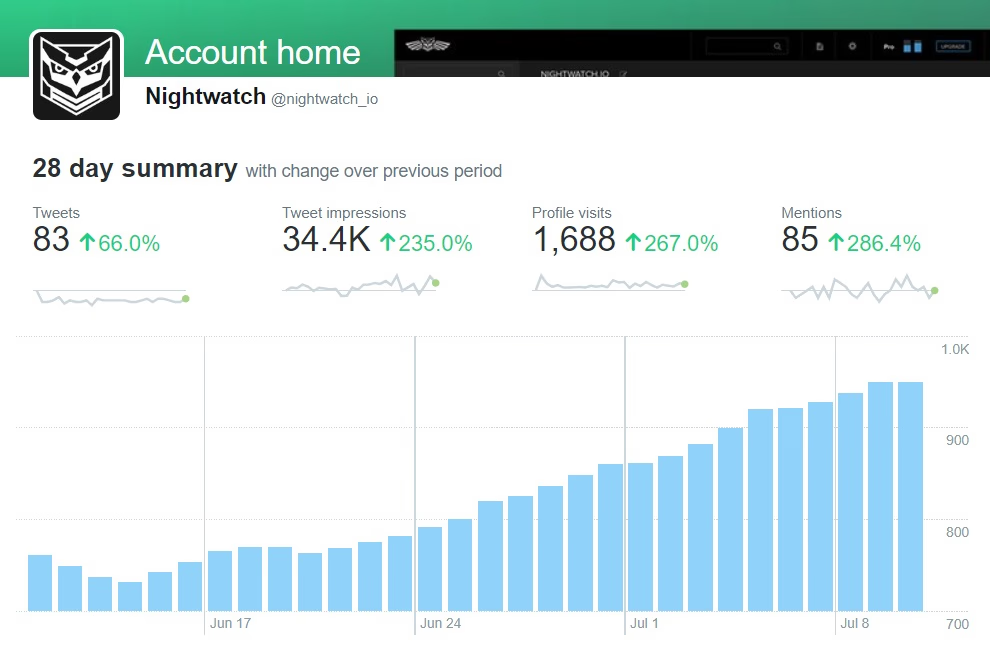How We Doubled Our Twitter Engagement Organically
In times when you can buy literally everything — from likes on Facebook to followers on Instagram — there is one thing that you cannot put a price tag on: your audience’s engagement.
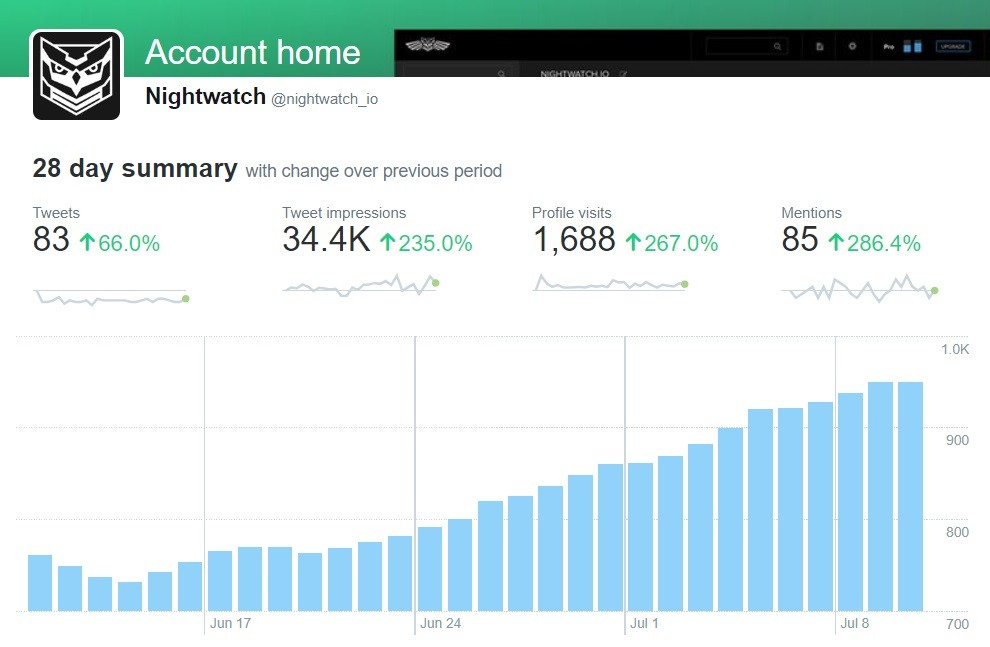
The situation gets even trickier if you take into consideration one of the favorite social media platforms — Twitter.
Twitter has over 336 million monthly active users and is still growing. If you are not taking it seriously, you might be at risk of losing tons of cash every hour, which is probably the reason why you aren’t a billionaire yet.
We have never been so flooded with information and news as we are nowadays. As shocking as it sounds — a day-old tweet is considered archaic, and to stay on top of your game, you not only need to produce content frequently but also ensure that you put sufficient amount of value in each of your 280-word pieces of text.
If the quantity of social media posts is silver, then the quality is gold, or who are we kidding, rhodium. And, as you might have experienced yourself, with quality comes the desired engagement.
Let’s think about it — what is the use of reaching 10,000 people who might have a brief look at your content, but never bother to actually engage in a discussion? Sadly, we all have seen those companies who work hard producing the content that never actually gets shared or discussed — and definitely not brought up when talking to friends like “Hey, have you seen their latest post?” And ouch… some of them have thousands of followers.
To say that our Twitter story is bumpy would be an understatement. At first, having been really busy with getting Nightwatch off the ground, we did not fully appreciate what a powerful platform it can be (if used well). Our tweets were rather rare and boring, usually focused on sharing our own articles and published very inconsistently.
We had a busy beginning of the year development-wise, and when April finally came around, we realized that our last tweet was posted in… January.
So, naturally, when we started running our Twitter account again (or rather reanimated our Twitter account), we were sure about one thing — gaining thousands of followers but with little to no engagement was the last thing we want to happen to us. And a few months later, here we are — small, but steadily growing and with the ever-present support of our demanding yet loyal audience (cheers, guys!)

So how exactly did we organically double our Twitter engagement and increased the number of followers in a month?
Before you think it was all flowers and butterflies, be warned — it didn’t just happen. It was a long process with highs and lows that involved quite a few steps we are going to describe below.
Let’s get to the bottom of it, shall we?
1. Make Them Like You
It is no secret to say that without valuable and useful content, you can be posting 100 tweets a day and nobody will care. How to make sure your content is perceived as “worth reading”? Well… Start with the end in mind.
We have a few tips here.
First, you need to remember that for people to trust you, they need to like you. And for them to like you, you have to show them yourself by setting the right tone of your company’s communication. It’s not only about dry facts and curating the content. You have to present yourself as what you really are — a human being.
Recipe for that?
- Set a scale for the right tone: be it professional or friendly, cool or warm
- Use funky emojis (and yes, we have a special section about emoji in our brand book)
- Add your personal opinions (even unpopular ones and especially unpopular ones)
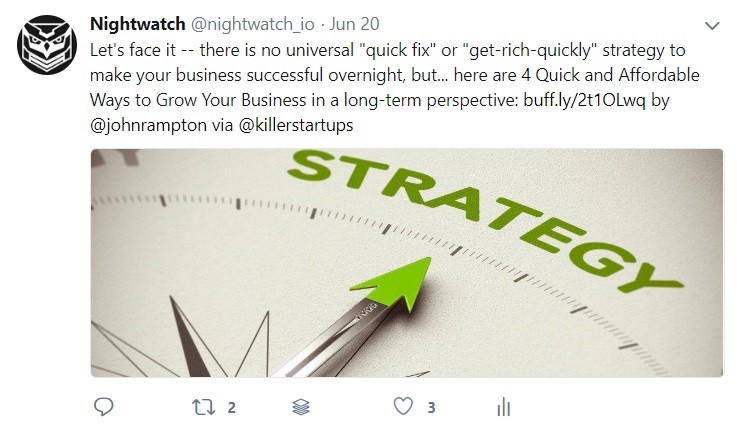
Furthermore, think: what is the main drive for people to take an action?
It’s not a surprise that the answer is simply: good ol’ curiosity and the desire to learn.
Don’t tweet about facts; tweet about opportunities to learn.
By using rhetorical questions, how-to’s, and tips and tricks tweets, you are allowing your audience to decide whether you have the knowledge they wish to possess too. And very often, they do. And for God’s sake, don’t be so selfish! Research and use the curated content which your followers can benefit from (we’ll tell more about it below).
The more valuable content you produce and put out there, the more your audience trust you and in the long run — like you.
Once you have this baseline set, you can move on to adding a piece of your personal opinion here and there. We know that our audience consists mainly of Internet-savvy SEO and marketing enthusiasts who are eager to start a discussion if their point of view differs. And we love it! This is also the reason why we are not frugal with a little sarcasm if the news we encounter elsewhere seem ridiculous.
It turns out that the less you try to please your audience by being neutral, the more trust you gain. Bring those unpopular opinions in. Be transparent and your followers will come to appreciate it.
2. Credit Other Authors (a lot)
Producing content can be both exhausting and extremely rewarding. If you want to ensure that your articles get the well-deserved exposure and engagement, you have to put significant amount of time and effort to make it happen.
Welcome to the era of the information overload: your audience doesn’t care much if the content they are reading is written by you or other folks in your industry. The only requirement is for the content to be worth their time (read: valuable and interesting).
This is exactly where the content curation comes into play.
Sharing others people’s work and crediting them for it does three things:
- Allows you to deliver fresh content on a consistent basis
- Builds your credibility as an expert who regularly educates himself/herself about the industry
- Establishes new connections and encouraging others to give back by sharing your work
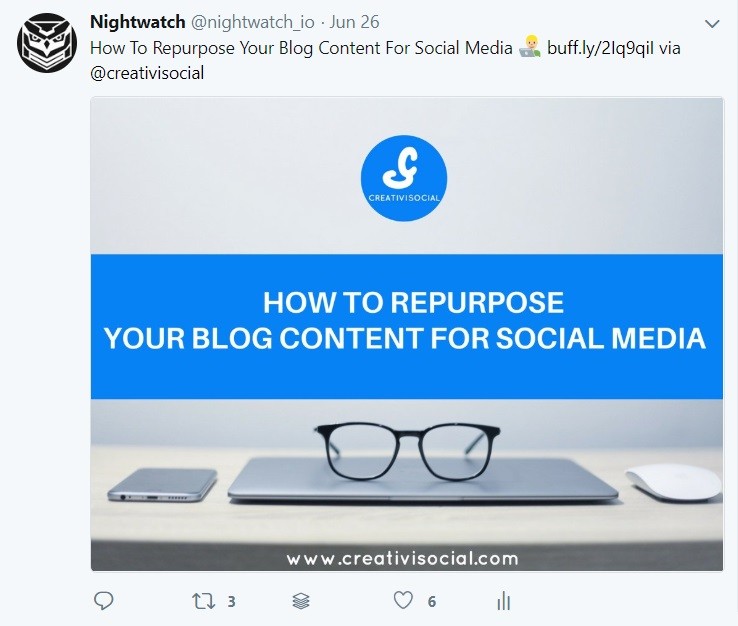
To put it short — there is literally no drawback to sharing valuable and informative articles from other experts in your industry. If done well, the only way is to benefit from this.
Yet, many of the companies seem to be only focusing on producing and promoting their own content, thinking that sharing others people’s work would somehow undermine their own — or worse, they would lose the share market promoting their competitors.
Our only answer to this, based on our own experience (and the experience of many others) is: bullshit.
To put it in numbers, all of our Twitter stats — including favourites, RTs, mentions, tweets impressions, profile visits and khm… followers too — went up on average more than 200%.
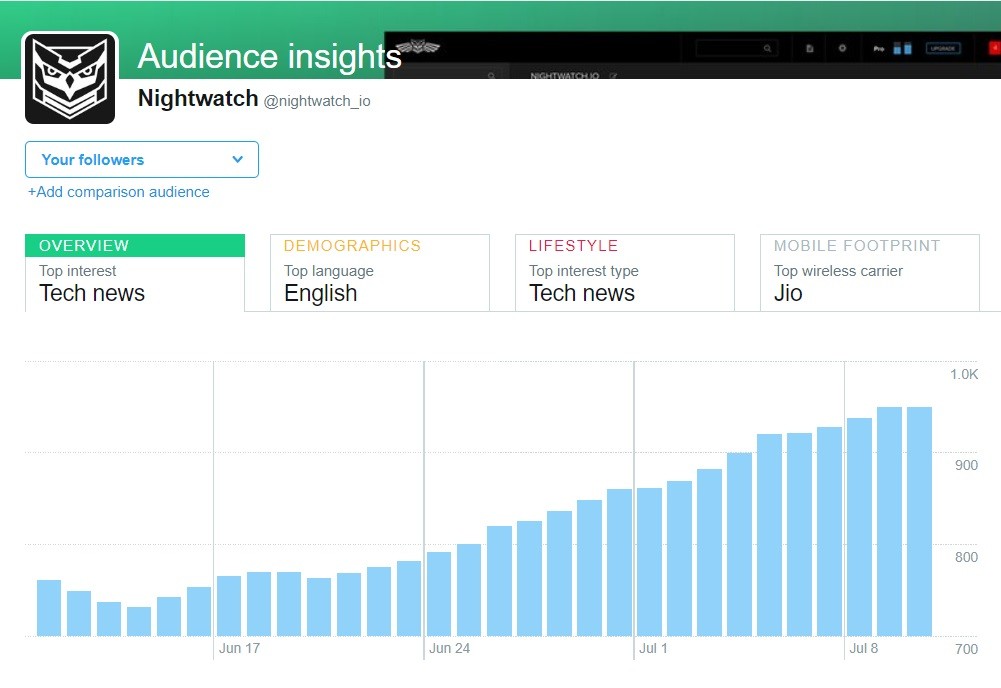
A big chunk of this success is contributed to providing our audience with valuable content produced by other, talented writers who are willing to share our articles in return.
Still not sure if networking on Twitter can help you grow your account? Then maybe this can change your mind.
3. Do Win-Win Twitter Outreach
Now, this is a biggie, and we were highly aware of the risk we were taking the moment we had decided to do it.
But let’s clarify things first.
Twitter outreach — what exactly do we mean?
It’s not much different from blogger outreach where your primary goal is to approach an individual (e.g. a blog editor) with a compelling message to get something you need and offer something valuable in return (e.g. guest post for a link).
Twitter outreach, though, is not something that many companies do, or at least, do right.
And oh boy, we really wish we had done it earlier. Having had quite a lot of experience with blogger outreach beforehand, approaching Twitter users should have been easy-peasy, right?
Well… Considering the ridiculous amount of bots and automated private messages overflowing your inbox the very moment you click the “follow” button, one would expect that our message would sink in the ocean of spammy texts.
Guess what? It didn’t.
Quite the opposite actually, and were surprised to see how companies we never really connected with, other than on Twitter, are willing to share our content for free (and frequently) and are looking for collaboration opportunities.
How exactly did we do it?
We believe in the magic of giving before taking. And so, our first step was to choose people and accounts who, in our point of view, produce value for their audience. We made a list of users tweeting about SEO, digital marketing, or new tech tools.
Then, we made sure to write them a compelling message to communicate that our audience is also benefiting from consuming the content provided by the chosen influencers or brand. It was already a win-win. We had fresh content, and the exceptional work of others was getting more exposure.

But it also built a strong connection and trust between those chosen accounts and us. At that point, whenever our article was out, they were more than happy to give back and share it with their audience. In our message, we highlighted the obvious benefit of such collaborations for both sides.
And truly, mutual sharing of informative, thought-provoking articles can only benefit everyone in the industry. Try it out.
4. Do Marketing Automation Right
Sounds simple, huh?
Well, we gotta say that the road was bumpy at times. And we would lie if we said that we never experimented with Twitter growth applications or bots. We are also the first ones to admit that it took us some time to realize that it leads nowhere.
We had a short fling with a popular Twitter bot. And while nothing bad can be said about the app itself, we quickly learned that trusting the machine to do the job of a human, especially when it involves interaction with other humans, is just not going that well.
Among retweeting and liking the irrelevant tweets, attracting other bots to follow us, we also were forced by Twitter to change our password… twice in a month. The vision of losing our account was scary, so we didn’t try to set up the tool again, obviously.
Does it mean that all growth automation tools are not a good idea?
Well… not necessarily. As long as you are acutely sure what your expectations are and your account doesn’t come across as spammy. Feel free to experiment and grow your accounts in other ways than organic — in the end, who really has the time to tweet every day or click “follow”/“unfollow” all day long?
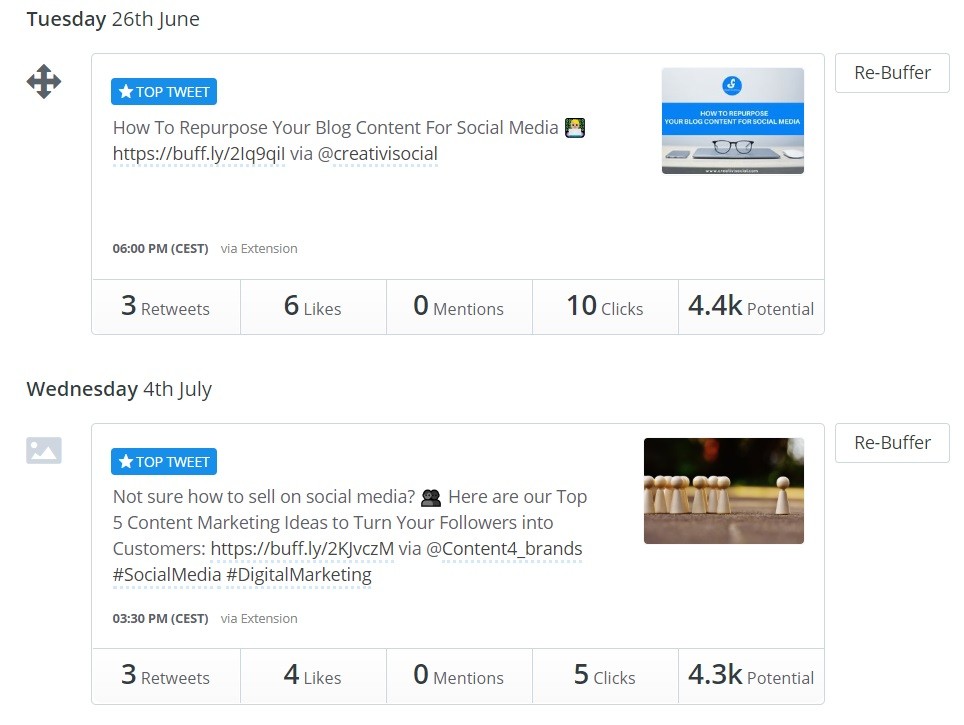
Some other apps worked for us though: we now manage your content calendar and schedule posts in advance (almost) effortlessly. While they aren’t a growth tool, they’re definitely useful to help you stay sane and organized while managing your Twitter account (and other social media platforms).
5. What Else?
The list of things you can do to grow your Twitter organically is unlimited if you commit to staying creative.
Here are some other unconventional approaches you can use:
Twitter Lists
This is probably one of the most underestimated techniques for drawing maximum benefits from your Twitter account. Lists of profiles tweeting about a certain niche can be a real treasure. You can use them for content inspiration or curation, finding blogs for your outreach, or simply making connections with experts in your industry. As they say: You never know unless you try.
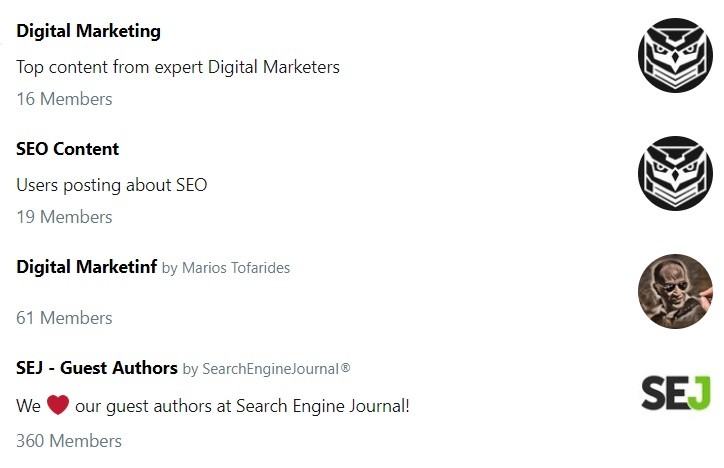
Top Tweets
The simple thing of pinning a tweet mentioning the recent article proved to be extremely effective in gaining more exposure for our content. Anyone who visits our profile for the first time can see the pinned tweet at the top of our feed, therefore if they are interested at all, they usually actively engage with this and other recent tweets first. Simple, yet effective.
Twitter Search
This is a method not used by anyone we know (hop on board before everyone else!), which really helped us expand our bloggers outreach list exponentially! And it’s very easy to implement.
Depending on your objective (e.g., find a guest post opportunity) all you have to do is put into a search bar certain phrases, such as “looking for SEO” or “looking for a guest post.” It’s a simple way to filter the tweets which might help you in your other marketing activities, outside of Twitter, while maximizing its potential. You can use it for as many things, as your creativity allows, and you never really know what may come out of it! Yay fun! Ready?
Final Thoughts
As you can see, Twitter can be an extremely powerful platform, if you know how to approach it.
And trust us, we get it.
It’s tempting to strive for acquiring thousands of followers and seeing your account growing day by day, but…
When estimating the real value of your social media presence, you cannot ignore the importance of your audience’s engagement and willingness to share your content with the world.
And there is no shortcut to that, although the genuine strategy and hacks presented above, would surely accelerate the growth.
Share those tips with your fellow marketers, and let’s all try to make the overloaded social media world a better place by collaborating, promoting, and sharing the content that actually matters.
